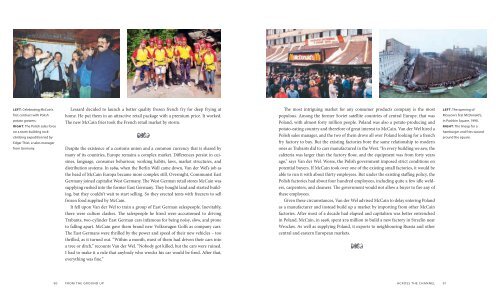From the Ground Up - McCain Foods Limited
From the Ground Up - McCain Foods Limited
From the Ground Up - McCain Foods Limited
Create successful ePaper yourself
Turn your PDF publications into a flip-book with our unique Google optimized e-Paper software.
LEFT: Celebrating <strong>McCain</strong>’s<br />
first contract with Polish<br />
potato growers.<br />
RIGHT: The Polish sales force<br />
on a team-building rockclimbing<br />
expedition led by<br />
Edgar Thiel, a sales manager<br />
from Germany.<br />
Lessard decided to launch a better quality frozen french fry for deep frying at<br />
home. He put <strong>the</strong>m in an attractive retail package with a premium price. It worked.<br />
The new <strong>McCain</strong> fries took <strong>the</strong> French retail market by storm.<br />
Despite <strong>the</strong> existence of a customs union and a common currency that is shared by<br />
many of its countries, Europe remains a complex market. Differences persist in cuisines,<br />
language, consumer behaviour, working habits, laws, market structures, and<br />
distribution systems. In 1989, when <strong>the</strong> Berlin Wall came down, Van der Wel’s job as<br />
<strong>the</strong> head of <strong>McCain</strong> Europa became more complex still. Overnight, Communist East<br />
Germany joined capitalist West Germany. The West German retail stores <strong>McCain</strong> was<br />
supplying rushed into <strong>the</strong> former East Germany. They bought land and started building,<br />
but <strong>the</strong>y couldn’t wait to start selling. So <strong>the</strong>y erected tents with freezers to sell<br />
frozen food supplied by <strong>McCain</strong>.<br />
It fell upon Van der Wel to train a group of East German salespeople. Inevitably,<br />
<strong>the</strong>re were culture clashes. The salespeople he hired were accustomed to driving<br />
Trabants, two-cylinder East German cars infamous for being noisy, slow, and prone<br />
to falling apart. <strong>McCain</strong> gave <strong>the</strong>m brand new Volkswagen Golfs as company cars.<br />
The East Germans were thrilled by <strong>the</strong> power and speed of <strong>the</strong>ir new vehicles – too<br />
thrilled, as it turned out. “Within a month, most of <strong>the</strong>m had driven <strong>the</strong>ir cars into<br />
a tree or ditch,” recounts Van der Wel. “Nobody got killed, but <strong>the</strong> cars were ruined.<br />
I had to make it a rule that anybody who wrecks his car would be fired. After that,<br />
everything was fine.”<br />
The most intriguing market for any consumer products company is <strong>the</strong> most<br />
populous. Among <strong>the</strong> former Soviet satellite countries of central Europe, that was<br />
Poland, with almost forty million people. Poland was also a potato-producing and<br />
potato-eating country and <strong>the</strong>refore of great interest to <strong>McCain</strong>. Van der Wel hired a<br />
Polish sales manager, and <strong>the</strong> two of <strong>the</strong>m drove all over Poland looking for a french<br />
fry factory to buy. But <strong>the</strong> existing factories bore <strong>the</strong> same relationship to modern<br />
ones as Trabants did to cars manufactured in <strong>the</strong> West. “In every building we saw, <strong>the</strong><br />
cafeteria was larger than <strong>the</strong> factory floor, and <strong>the</strong> equipment was from forty years<br />
ago,” says Van der Wel. Worse, <strong>the</strong> Polish government imposed strict conditions on<br />
potential buyers. If <strong>McCain</strong> took over one of <strong>the</strong> existing small factories, it would be<br />
able to run it with about thirty employees. But under <strong>the</strong> existing staffing policy, <strong>the</strong><br />
Polish factories had about four hundred employees, including quite a few idle welders,<br />
carpenters, and cleaners. The government would not allow a buyer to fire any of<br />
<strong>the</strong>se employees.<br />
Given <strong>the</strong>se circumstances, Van der Wel advised <strong>McCain</strong> to delay entering Poland<br />
as a manufacturer and instead build up a market by importing from o<strong>the</strong>r <strong>McCain</strong><br />
factories. After most of a decade had elapsed and capitalism was better entrenched<br />
in Poland, <strong>McCain</strong>, in 1998, spent $79 million to build a new factory in Strzelin near<br />
Wroclaw. As well as supplying Poland, it exports to neighbouring Russia and o<strong>the</strong>r<br />
central and eastern European markets.<br />
90 <strong>From</strong> <strong>the</strong> <strong>Ground</strong> up<br />
Across <strong>the</strong> chA nnel 91<br />
LEFT: The opening of<br />
Moscow’s first McDonald’s,<br />
in Pushkin Square, 1990.<br />
RIGHT: The lineup for a<br />
hamburger and fries wound<br />
around <strong>the</strong> square.






